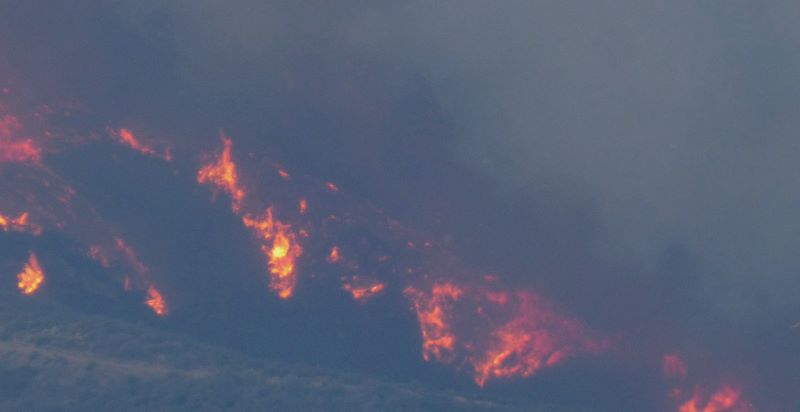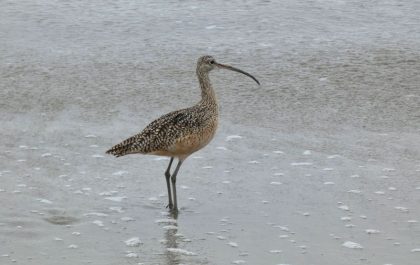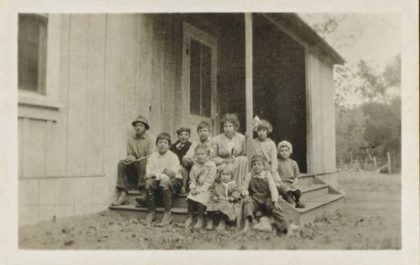
In early October, the Santa Ana winds returned. The wind had surprised and delighted me when I arrived from Illinois the previous January. It felt a lot less friendly now. All that year we had lived in fear of an enemy attack on the coast. Now everyone began talking about the threat of wildfire, and how the enemy could use spies or even balloons to set fires. There had been really terrible fires in 1903 and again in 1930 and 1935 and 1937. There had even been a smaller one just months before I arrived in Malibu.
We would be in trouble, everyone said, if a fire broke out now because so many firefighters were serving overseas. The fire warden increased the number of fire patrols, and there were volunteers from Civil Defense helping out, but there were hundreds of square miles to patrol in the Malibu district and not enough people.
The wind blew for days, sucking the moisture out of the hills, leaving everything dry and covered in dust. It made everything uncomfortable. At the beach, wind-blown sand stung and got into our eyes and hair. The gale ironed out the waves and made patterns on the surface of the ocean. When the sun went down, the water seemed brighter than the sky, reflecting like glass. Those sunsets were a clear, bright orange, fading to a somber gray, the color of ashes. At school, the wind covered everything in coarse gray grit, and the classrooms were hot and stuffy. The temperature soared up to ninety degrees and stayed there, only going down into the seventies at night.
The men on coast patrol hated the wind. It blasted their skin and got into their clothes, rubbing them raw. My friend Bob said the sand got into their tents and even into their food.
Mouse the cat also hated the wind. It filled his fur with static electricity and made him spark whenever he touched anything or whenever anyone touched him. He spent most of his time under my bed. Yuki, Kitty’s little dog, didn’t like it either. The wind moaned down the chimney and around the corners of the house and made things creak and clatter. All the little noises made Yuki restless. He prowled the house, growling at things only he could see.
He was the one who woke me up on the night of the fire. I don’t know how he knew. The wind was raging, but there wasn’t anything to see at first, except a faint glow from behind the mountain. I opened the window for a better look and the bitter, choking smell of smoke rushed into the room.
Aunt Maddie wasn’t home. It was one of those nights when she had a late meeting and was staying in town. I dressed quickly, hurried to the Calzadas’ cottage, and knocked. The sound was drowned out by the roaring of the wind, but Mr Calzada opened the door, already dressed. I didn’t have to tell him.
“Go get Mr Zelle,” he ordered. I could tell he was worried, but trying not to let it show. “Tell him we have to leave. The phone lines are down, I couldn’t reach the fire station. We are on our own. We’ll go to the beach. We’ll be safe there. “I’ll get Jacob and check on the neighbors. We have to get the animals out. Then we can come back for anything we need from the house. Go, quickly!”
I ran.
The wind was like a live thing, tearing at my hair and clothes, throwing leaves and dust at me. I glanced back, and saw with a shock the glow of flames on the ridge behind the canyon. It looked like a volcano, red as lava. My heart pounding, I raced down the drive to Mr Zelle’s house. He, too, was already awake and dressed, his hands full of sheet music, his face drawn and haggard.
I rushed back to the barn, but I wasn’t needed there. The goats were rounded up in their pen and Jacob was busy putting halters and leads on the horses. I ran back to the house, grabbed the indignant Mouse and stuffed him into his carrier. Then I hesitated. Would we be able to get back? What if we weren’t? What if the house burned? I threw a change of clothes in my school bag, together with the pictures of my family and their letters that I kept on the bureau. I added my journal, the notebook where I wrote the snatches of music I was trying to compose, and the folder with my copies of our newsletter, The Coastwatcher. Then I slipped into Aunt Maddie’s office.
There were so many things in here: books, papers, paintings on the walls, treasures and curiosities. I didn’t know what would be the most important things to take, but I figured that the manuscript for her latest book was a priority. It sat in a pile of notes and corrections next to her old Remington typewriter. There were several framed pictures on the desk. One was my aunt with my mother and my Uncle Jimmy, another was the photo of my aunt at the beach that we had found among the things stored in the apartment over the stables that was Jacob’s room now. I grabbed them all and stuffed them in my bag with the manuscript. Something shiny caught my eye on the way out the door. It was the animal broach that my aunt wore on special occasions. It was pinned to the lapel of her black wool coat, hung by the door. The diamond eyes seemed to wink at me. I unpinned it with clumsy fingers, surprised at how heavy it was. I pinned it in my pocket and rushed from the room. I could hear Mrs Calzada calling for me, a note of panic in her voice.
She came out of my Aunt’s room with a bag of clothes and things, and gestured towards the door. I felt a stab of regret for the boxes we were keeping for Kitty’s family while they were at Manzanar. I knew there was no way to bring them, no space, no time, but I ran back and grabbed Kitty’s sketchbook, the one filled with her beautiful drawings.
I threw my bag over my shoulder, scooped up Yuki in one arm, and Mouse’s carrier in the other, and hurried out the door. It was like stepping into hell.
The wind was hot and the air was full of smoke and dust. It should have been pitch dark, but there was a dim glow from the fire sweeping through the hills above us.
Mr Zelle was waiting by the truck. “Mr Calzada and Jacob have taken the horses to the beach,” he shouted. “We follow.”
I nodded. I was astonished to see Jessie with him.
“I’m coming with you,” she said. “My parents and the baby are in town,” she explained, while we loaded the truck. She was shouting to be heard over the roaring of the wind.
“Our housekeeper and the gardener have their hands full trying to help get that old lady who lives in the house next door, and she was having hysterics—she always does—and her housekeeper was panicking, and there wasn’t any room in the car anyway because of the dogs, so I told them I would come with you, and Mr Calzada agreed. Let me take Mouse’s carrier.” She took it and put it on the seat of the truck. “We can ride in the back with the goats.”
I carefully set my bag with Aunt Maddie’s manuscript and Kitty’s sketchbook in the cab with Mouse, but when I went to hand Yuki to Mrs Calzada, he scrabbled free. I reached to grab him, but he dashed away, barking like mad. Jessie was after him before I could move. I ran after her, both of us calling for the little dog.
I didn’t know what got into him. He was always good about coming when he was called. I remembered how Kitty told me she and her brother had trained him, and how proud she was of the little dog’s skill at learning commands and tricks, but tonight the devil was in him. He ran and we followed—across the lawn, through the gate, and onto the trail that led into the canyon. And now I knew what had made him run. Someone was there, shouting for help.
The little dog was beside him when Jessie and I arrived, out of breath and half choked by smoke. It was Mr Samov. He was on the ground. Yuki was licking his face.
I wondered if the fire had already reached the old hermit’s cave and felt a pang of sorrow at the thought of his books and treasures burning up. He must have come all the way down that precarious trail in the pitch dark, with the fire behind him all the way, only to meet with disaster right here.
“I was praying someone would hear me,” he gasped. “My leg—I think it must be broken.”
“What do we do?” Jessie sounded panicked.
I was surprised. She was always so unflappable. “You’re the one who took all of those first aid classes,” I reminded her. “You can help.”
She knelt, took a deep breath, and examined the leg.
“At least it’s not the kind of break with bones sticking out,’ she said. “Maybe I can make a splint. Find some branches for me, James. Straight ones if you can.”
I could do better than that. We had gathered boards from an old packing crate to use for our tree house but we never got around to using them. They were right by the fence where I left them back in July. While I was trying to pick some that would be the right size, Mr Zelle rushed up. I explained quickly.
“It’s Mr Samov. He’s hurt his leg. Jessie’s making a splint, but I don’t know how we’re going to get him out of here,” I said.
“I can help!” Mr Zelle said, and ran back towards the house.
With the wood from the packing crate and strips of my shirt Jessie was able to make a splint. Her hands shook and she muttered to herself under her breath the whole time, but she did it. I helped as much as I could, holding the wood slats in place while she wrapped and tied the bandage. It must have hurt Mr Samov a lot. He drifted in and out of consciousness, but at last it was done. Mr Zelle arrived moments later with the ranch wheelbarrow and a flashlight— this was no time to worry about dim out rules, not with the whole mountain on fire like a massive beacon. Somehow the three of us managed to get Mr Samov into the barrow—I’m still not sure how. Yuki jumped up with him, crouching protectively on his chest.
Trundling our cargo back to the truck in the dark with the wild howling and just the frail beam of light from the flashlight to guide us was like something from a nightmare. Mrs Calzada was waiting for us. She had driven the truck onto the lawn as far as she could to make it easier for us to reach it. Getting Mr Samov out of the wheelbarrow and into the truck was even more difficult than getting him into the wheelbarrow, but between the four of us we managed it. He rode in back with Jessie and me and the goats. Yuki stayed close by the old man’s side. Jessie I I had our hands full with the goats. Mr Zelle drove and Mrs Calzada sat with him in the cab and held Mouse’s carrier. There was no room for the chickens, and no way to catch and carry them. Mr Calzada left the coop open for them. There wasn’t anything else we could do.
As we drove off, we could see the mountains that ringed the canyon burning with flames that must have been a hundred feet high. It seemed impossible that anything could survive. As we turned onto the road and the ranch disappeared from view I had the sickening feeling that we would never see it again.




